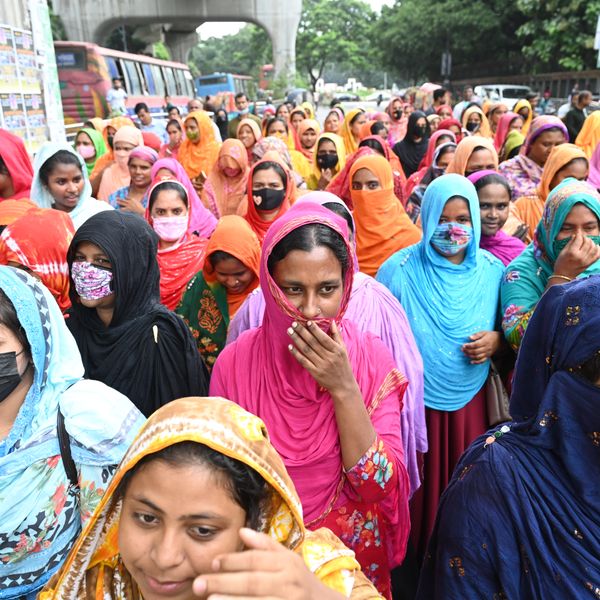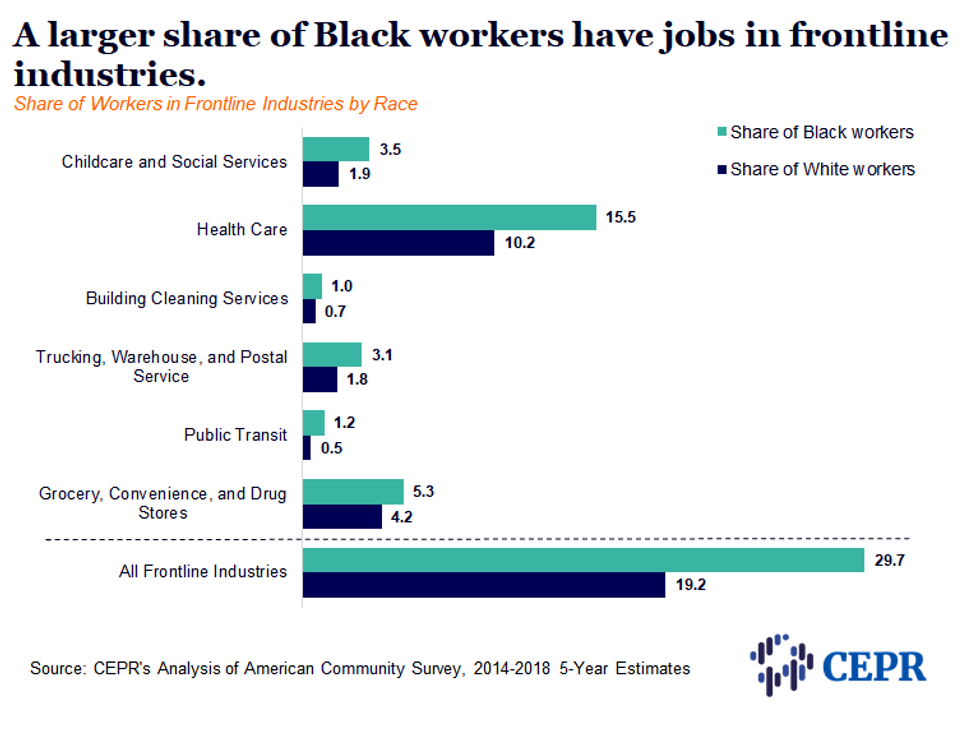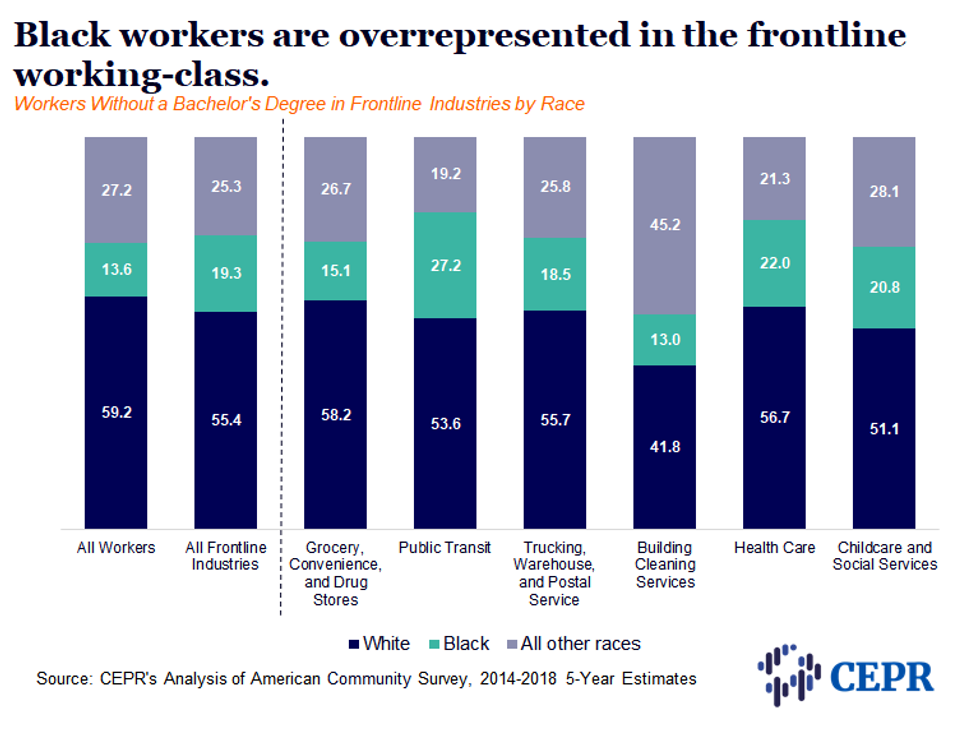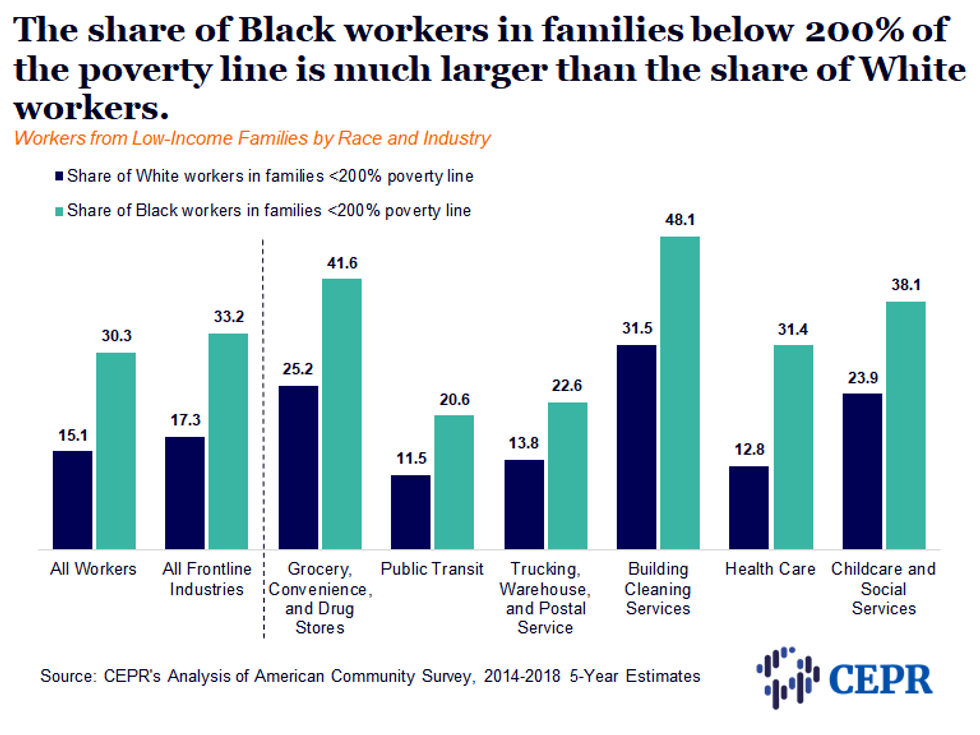
To increase the power, economic security, and well-being of today's working-class, we must increase the power, economic security, and well-being of Black people. (Photo Gilles Mingasson/Getty Images)
Racial Inequality Among Workers in Frontline Industries: Black Workers Are Overrepresented and Undercompensated
The history of the United States is the history of exploited black labor, beginning with slavery and continuing today in the form of endemic structural racism.
The three figures below compare Black and White workers in six frontline industry groups (see our previous report for methodology). These figures show that:
- Black workers are much more likely to work in frontline industries than White workers. As Figure 1 shows, nearly three out of every ten (29.7 percent) Black workers work in one of six frontline industry groups, compared to just under one out of every five (19.2 percent) White workers. Per our previous report, 17 percent of workers in frontline industries are Black (58.8 percent are White), while about 12 percent of the total (employed) workforce is Black.
- Among people without four-year college degrees working in frontline industries--a group we refer to as the frontline working-class--one-in-five workers are Black. Overall, about one-in-seven (13.6 percent) employed people without four-year degrees are Black. But among the frontline working-class, nearly one-in-five workers are Black (Figure 2). In Public Transit and Health Care, about 27 percent and 22 percent of workers without four-year degrees are Black.
- Black workers, including Black workers in frontline industries, are about twice as likely as White workers to live in low-income families (families with incomes under 200 percent of the officialpoverty line, or about $43,500 for a family of four in 2020). Being "essential" does not guarantee good pay, especially for Black workers on the frontlines. As seen in Figure 3, about one-third of (33.2 percent) Black workers in frontline industries live in families with low incomes, compared to less than one-fifth (17.3 percent) of White workers. The racial income disparity is particularly large in the Health Care industry. About 32 percent of Black Health Care industry workers live in low-income families, nearly 2.5 times the percentage of White Health Care industry workers (12.8 percent) living in low-income families.
- Among the frontline working-class, nearly two-in-five Black workers live in a low-income family. Among Black workers without a bachelor's degree in frontline industries, 38 percent live in low-income families (not shown, data available on request). The share for Whites is far smaller, with only 22.4 percent of White frontline industry workers without a bachelor's degree living in low-income families.
Black workers are essential, and have been since this country's inception. The history of the United States is the history of exploited black labor, beginning with slavery and continuing today in the form of endemic structural racism. Black workers in frontline industries contend with additional hazards above and beyond the challenges that all frontline workers face, including but not limited to a higher COVID-19 death rate and the ever-present threat of violence when they are not at work.
Many of the broadly universal policies we have recommended previously would benefit Black frontline workers, but race-neutral labor and social policies are not enough by themselves to tackle entrenched inequalities. We also need policies that are directly targeted to reduce racial inequities as well as systemic changes to policing, the criminal justice system, and other institutions.
Finally, prevailing political and media narratives about the US working-class need to change. In politics and the mainstream media, the term "working-class" is often used to refer to a subset of the White electorate. Yet, Black people are much more likely to self-identify as working-class, and to hold jobs that do not require college degrees in which they have "comparatively little power or authority." To increase the power, economic security, and well-being of today's working-class, we must increase the power, economic security, and well-being of Black people.
Figure 1:
Figure 2:
Figure 3:
An Urgent Message From Our Co-Founder
Dear Common Dreams reader, The U.S. is on a fast track to authoritarianism like nothing I've ever seen. Meanwhile, corporate news outlets are utterly capitulating to Trump, twisting their coverage to avoid drawing his ire while lining up to stuff cash in his pockets. That's why I believe that Common Dreams is doing the best and most consequential reporting that we've ever done. Our small but mighty team is a progressive reporting powerhouse, covering the news every day that the corporate media never will. Our mission has always been simple: To inform. To inspire. And to ignite change for the common good. Now here's the key piece that I want all our readers to understand: None of this would be possible without your financial support. That's not just some fundraising cliche. It's the absolute and literal truth. We don't accept corporate advertising and never will. We don't have a paywall because we don't think people should be blocked from critical news based on their ability to pay. Everything we do is funded by the donations of readers like you. Will you donate now to help power the nonprofit, independent reporting of Common Dreams? Thank you for being a vital member of our community. Together, we can keep independent journalism alive when it’s needed most. - Craig Brown, Co-founder |
The three figures below compare Black and White workers in six frontline industry groups (see our previous report for methodology). These figures show that:
- Black workers are much more likely to work in frontline industries than White workers. As Figure 1 shows, nearly three out of every ten (29.7 percent) Black workers work in one of six frontline industry groups, compared to just under one out of every five (19.2 percent) White workers. Per our previous report, 17 percent of workers in frontline industries are Black (58.8 percent are White), while about 12 percent of the total (employed) workforce is Black.
- Among people without four-year college degrees working in frontline industries--a group we refer to as the frontline working-class--one-in-five workers are Black. Overall, about one-in-seven (13.6 percent) employed people without four-year degrees are Black. But among the frontline working-class, nearly one-in-five workers are Black (Figure 2). In Public Transit and Health Care, about 27 percent and 22 percent of workers without four-year degrees are Black.
- Black workers, including Black workers in frontline industries, are about twice as likely as White workers to live in low-income families (families with incomes under 200 percent of the officialpoverty line, or about $43,500 for a family of four in 2020). Being "essential" does not guarantee good pay, especially for Black workers on the frontlines. As seen in Figure 3, about one-third of (33.2 percent) Black workers in frontline industries live in families with low incomes, compared to less than one-fifth (17.3 percent) of White workers. The racial income disparity is particularly large in the Health Care industry. About 32 percent of Black Health Care industry workers live in low-income families, nearly 2.5 times the percentage of White Health Care industry workers (12.8 percent) living in low-income families.
- Among the frontline working-class, nearly two-in-five Black workers live in a low-income family. Among Black workers without a bachelor's degree in frontline industries, 38 percent live in low-income families (not shown, data available on request). The share for Whites is far smaller, with only 22.4 percent of White frontline industry workers without a bachelor's degree living in low-income families.
Black workers are essential, and have been since this country's inception. The history of the United States is the history of exploited black labor, beginning with slavery and continuing today in the form of endemic structural racism. Black workers in frontline industries contend with additional hazards above and beyond the challenges that all frontline workers face, including but not limited to a higher COVID-19 death rate and the ever-present threat of violence when they are not at work.
Many of the broadly universal policies we have recommended previously would benefit Black frontline workers, but race-neutral labor and social policies are not enough by themselves to tackle entrenched inequalities. We also need policies that are directly targeted to reduce racial inequities as well as systemic changes to policing, the criminal justice system, and other institutions.
Finally, prevailing political and media narratives about the US working-class need to change. In politics and the mainstream media, the term "working-class" is often used to refer to a subset of the White electorate. Yet, Black people are much more likely to self-identify as working-class, and to hold jobs that do not require college degrees in which they have "comparatively little power or authority." To increase the power, economic security, and well-being of today's working-class, we must increase the power, economic security, and well-being of Black people.
Figure 1:
Figure 2:
Figure 3:
The three figures below compare Black and White workers in six frontline industry groups (see our previous report for methodology). These figures show that:
- Black workers are much more likely to work in frontline industries than White workers. As Figure 1 shows, nearly three out of every ten (29.7 percent) Black workers work in one of six frontline industry groups, compared to just under one out of every five (19.2 percent) White workers. Per our previous report, 17 percent of workers in frontline industries are Black (58.8 percent are White), while about 12 percent of the total (employed) workforce is Black.
- Among people without four-year college degrees working in frontline industries--a group we refer to as the frontline working-class--one-in-five workers are Black. Overall, about one-in-seven (13.6 percent) employed people without four-year degrees are Black. But among the frontline working-class, nearly one-in-five workers are Black (Figure 2). In Public Transit and Health Care, about 27 percent and 22 percent of workers without four-year degrees are Black.
- Black workers, including Black workers in frontline industries, are about twice as likely as White workers to live in low-income families (families with incomes under 200 percent of the officialpoverty line, or about $43,500 for a family of four in 2020). Being "essential" does not guarantee good pay, especially for Black workers on the frontlines. As seen in Figure 3, about one-third of (33.2 percent) Black workers in frontline industries live in families with low incomes, compared to less than one-fifth (17.3 percent) of White workers. The racial income disparity is particularly large in the Health Care industry. About 32 percent of Black Health Care industry workers live in low-income families, nearly 2.5 times the percentage of White Health Care industry workers (12.8 percent) living in low-income families.
- Among the frontline working-class, nearly two-in-five Black workers live in a low-income family. Among Black workers without a bachelor's degree in frontline industries, 38 percent live in low-income families (not shown, data available on request). The share for Whites is far smaller, with only 22.4 percent of White frontline industry workers without a bachelor's degree living in low-income families.
Black workers are essential, and have been since this country's inception. The history of the United States is the history of exploited black labor, beginning with slavery and continuing today in the form of endemic structural racism. Black workers in frontline industries contend with additional hazards above and beyond the challenges that all frontline workers face, including but not limited to a higher COVID-19 death rate and the ever-present threat of violence when they are not at work.
Many of the broadly universal policies we have recommended previously would benefit Black frontline workers, but race-neutral labor and social policies are not enough by themselves to tackle entrenched inequalities. We also need policies that are directly targeted to reduce racial inequities as well as systemic changes to policing, the criminal justice system, and other institutions.
Finally, prevailing political and media narratives about the US working-class need to change. In politics and the mainstream media, the term "working-class" is often used to refer to a subset of the White electorate. Yet, Black people are much more likely to self-identify as working-class, and to hold jobs that do not require college degrees in which they have "comparatively little power or authority." To increase the power, economic security, and well-being of today's working-class, we must increase the power, economic security, and well-being of Black people.
Figure 1:
Figure 2:
Figure 3:




